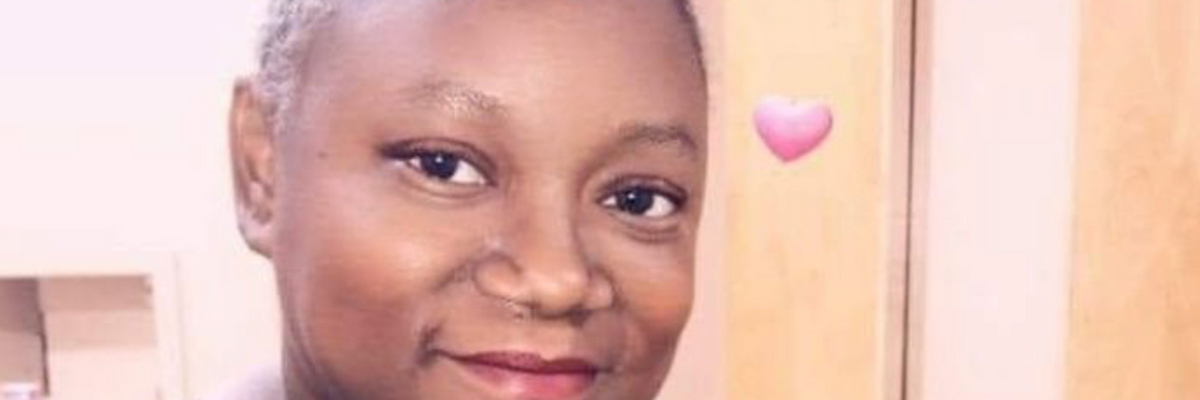The Black medical community is outraged--but not suprised--at the Covid-19 death earlier this week of an African American physician in Indiana who complained about what she said was racist treatment at the hands of hospital staff who downplayed her pain, refused to provide timely treatment, and prematurely sent her home.
"I was crushed. He made me feel like I was a drug addict, and he knew I was a physician."
--Dr. Susan Moore
Dr. Susan Moore, 52, died on Sunday, after testing positive for coronavirus on November 29, the New York Times reports.
On December 4, Moore posted on Facebook that despite presenting at IU Health North Hospital in Carmel with a respiratory rate in the 30s, a heart rate in the 150s, and a fever of 101.5deg F, she "had to beg to get Remdesivir," Gilead's broad-spectrum antiviral drug that can shorten recovery time in Covid-19 patients.
Moore said her first physician, Dr. Eric Bannec, did not want to administer Remdesivir because her chest x-ray looked normal.
"I then had to beg for a CT of my chest," she said--referring to a computerized axial tomography, or CAT, scan--"which I finally got and it showed large mediastinal lymphadenopathy right lower lobe infiltrate in a new left lower lobe infiltrate."
"After receiving two infusions of the Remdesivir, Dr. Bannec said I don't qualify, I'm not short of breath, he doesn't know why my neck hurts, and he doesn't feel comfortable giving me any narcotics," wrote Moore. "All I can do is cry, I was in so much pain. He said you can just go home right now."
"He did not even listen to my lungs, he didn't touch me in any way," she wrote. "He performed no physical exam. I told him you cannot tell me how I feel."
"I was crushed," Moore said in her video. "He made me feel like I was a drug addict, and he knew I was a physician."
Moore said that a second CT scan "showed new infiltrates in my lungs superiorly and new pleural effusion... in addition to new mediastinal lymphadenopathy."
Moore said was then prescribed the pain medication she so desperately needed--but had to wait hours before it was delivered.
"Why do I have to prove that there's something wrong with me in order for my pain to be treated?" asked an increasingly desperate Moore. "I maintain that if I were white, I wouldn't have to go through that. And that man, Dr. Bannec, never came back and apologized."
Moore says a patient advocate told her there was nothing that could be done. She also says she was told that she should just go home.
"This is how Black people get killed," she said, "when you send them home and they don't know how to fight for themselves."
Moore said she was finally given "adequate" pain relief and sent home on December 7, despite not feeling like she had recovered. Less than 12 hours later, she was rushed to another hospital, where she was treated for bacterial and Covid-19 pneumonia.
"Those people were trying to kill me," Moore said of her stay at IU Health North. "Clearly, everyone has to agree they discharged me way too soon."
Moore, whose cough was so severe she could barely speak, was eventually placed on a ventilator and intubated on December 10. Just over two weeks after posting her video, she died of complications from Covid-19.
Moore's son, 19-year-old Henry Muhammed, said that his mother, who suffered from the inflammatory lung disease sarcoidosis, was no stranger to medical racism.
"Nearly every time she went to the hospital she had to advocate for herself, fight for something in some way, shape or form, just to get baseline, proper care," Muhammed told the New York Times.
It's a familiar story for many Black people, who suffer from disproportionately higher rates of chronic illness and worse healthcare treatment and outcomes due to higher levels of poverty and documented systemic racism in which they are less likely to be listened to and believed by medical professionals plagued by implicit racial bias.
Combined with the glaring deficiencies of a for-profit healthcare system that delivers the worst outcomes among developed nations despite the highest per-capita costs, persistent racial bias and deep economic inequality have resulted in Black Americans being 3.7 times more likely to be hospitalized with Covid-19 than whites, and 2.8 times more likely to die from the virus, according to the U.S. Centers for Disease Control and Prevention.
Black women, who account for less than 3% of U.S. doctors, face additional challenges, both as physicians and as patients.
The Black medical community responded to Moore's death with an outpouring of grief, outrage--and ultimately, understanding.
Dr. Christina Council, a primary care physician in Maryland who is Black, told the Times that Moore's death "had had a huge impact.".
"Sometimes when we think about medical bias it seems so far removed," Council said. "We can sit there and say, 'OK, it can happen to someone that may be poorer.' But when you actually see it happen to a colleague and you're seeing her in the hospital bed and literally pleading for her life, it just hits a different way and really hits home and says, 'Wow, we need to do something.'"

